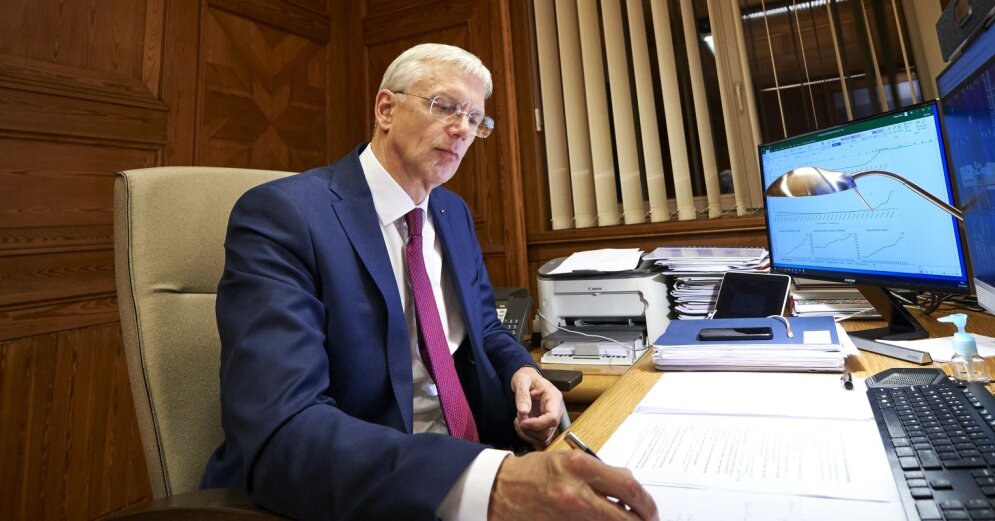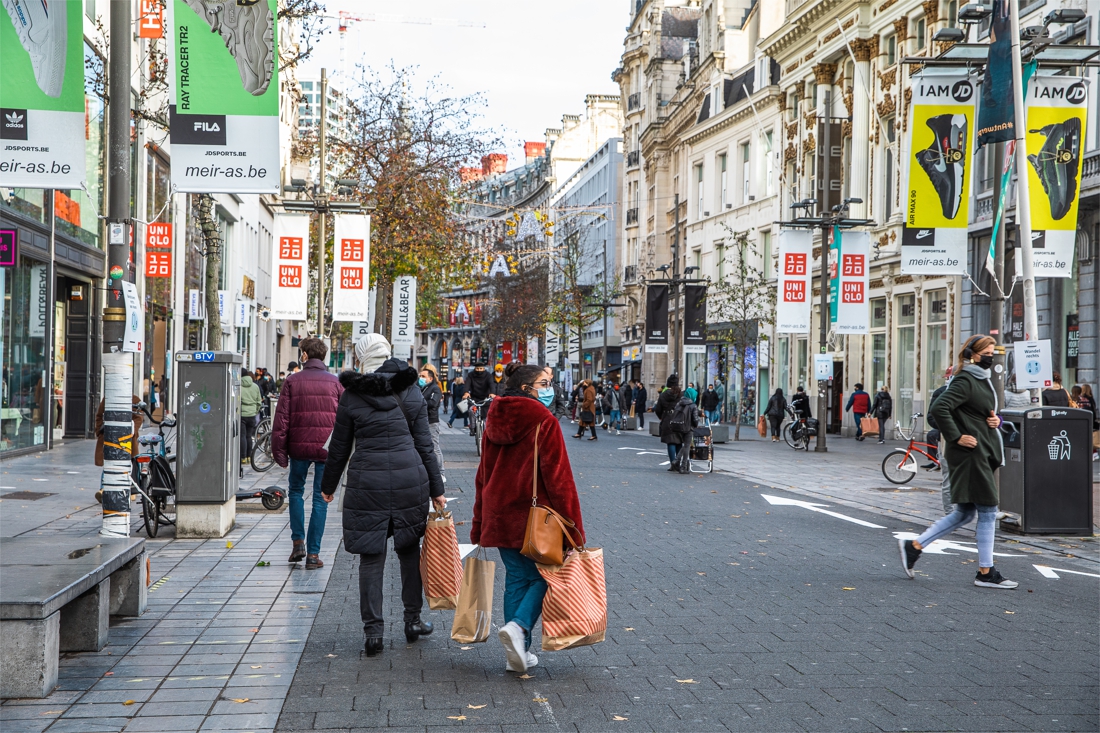After a session of almost ten hours Cabinet of Ministers On 1 December, it was decided to extend the state of emergency declared until 11 January 2021. Prime Minister Krišjānis Kariņš (JV) pointed out that private events are prohibited at this time.
–
Content will continue after the ad
Advertising
–
Prime Minister Krišjānis Kariņš (JV) said at a press conference after the government meeting, which lasted almost ten hours, that the situation with the spread of Covid-19 in Latvia is very serious.
When deciding on the extension of the Emergency, the Cabinet of Ministers decided that everyone should wear a face mask on public transport and outside the premises where there is more than one person. This also applies to jobs. Face masks may not be worn by children under the age of seven and people who cannot use them due to obvious functional impairment.
Gathering: 2 + 2
From December 3, everyone in Latvia must follow the “2 + 2 principle” in their daily routine – two meters, two people. So a distance of two meters must be observed and meetings must be limited to two people.
Until 11 January, all cultural venues, exhibitions, as well as fairs, including Christmas markets, have been closed. Libraries may hand out books for pick-up.
No private events may take place except within a single household. People living alone and in need of care can be visited according to the “2 + 2 principle”.
At funerals and baptisms, no more than 10 people (excluding those directly involved, such as the clergy) may be gathered outdoors, from no more than two households, using mouth and nose pads.
In the meantime, no more than 20% of the maximum number of people may be present at the same time in places of religious activity.
Organized meetings, pickets and marches may still take place, but a maximum of 25 people may attend, subject to epidemiological safety requirements – a physical distance of two meters and subject to the requirements of the organizer.
Education
Stricter security measures are also being introduced in the field of education. The face-to-face learning process may take place only in kindergartens and 1-4. classes. Schools must provide three square meters of space per pupil. From December 3, kindergarten workers must wear masks at all times. From 4 January, masks must be worn in schools, both during and outside the classroom, for both pupils and teachers.
The process of higher education, vocational education and adult continuing vocational education and non-formal education can only take place remotely. On the other hand, practical skills that cannot be acquired remotely can be acquired in person only individually – one teacher with one student.
The practical parts of interest education can only take place in person. Attempts by choirs and wind ensembles are not allowed in person.
Sports
From 3 December, on-site indoor sports training may only take place for Latvian adult national team, Olympic professional and Paralympic team athletes and adult professional athletes of international and higher league team sports teams (professionals whose main occupation is sports).
Other indoor sports training may take place only individually or in pairs with a coach, while group training for up to 10 people may only take place outdoors. It should be noted that tents or other temporary structures, if they have walls, are also perceived as indoor, but covered areas without walls are considered to be outdoor.
Shops and services
From 3 December, shops and service points must provide 15 square meters per visitor. Information on the number of people allowed must be clearly visible at the entrance. In small rooms, visitors can go one by one.
Economic service providers, shops and event organizers must ensure that people who do not wear a face mask or do it incorrectly (without covering both their mouths and nose) are not allowed on the premises and do not provide services to those who do not comply with epidemiological safety requirements.
All shops and shopping centers, regardless of the total sales area, may be open on weekdays from 6 am to 8 pm. However, only pharmacies, including veterinary pharmacies, may operate on Saturdays, Sundays and public holidays, and only groceries (except alcohol and cigarettes) may be sold in shops. hygiene products and fuel.
On weekdays, everyone works with the same square constraints. On Saturdays, Sundays and public holidays, sales outlets may not be open, except – pharmacies (including veterinary) and shops selling food (except alcohol and cigarettes), hygiene products, fuel.
Subject to epidemiological safety measures, beauty care providers – hairdressing and manicure providers – may operate.
Public transport
From 7 December, in order to protect people in public transport, the number of passengers must not exceed 50% of the vehicle’s capacity. If it is not possible to control the embarkation and disembarkation of passengers, the vehicle must be provided with instructions on the use of seats to ensure physical separation.
For additional security, although the spread of Covid-19 mostly takes place within the country and the infection in most cases is not traceable, from December 7, stricter control of people entering Latvia will begin to make sure that “Covidpass.lv” is filled in, thus facilitating infection control.
It is reported that the emergency situation in Latvia has been in force since November 9. It was announced in response to the rapid spread of Covid-19 infection and the growing risk of congestion in the health sector.
During this time, strict assembly and other restrictions were imposed to stabilize the situation and prevent the rapid spread of Covid-19. Likewise, public events must not take place in person during an emergency, nor may entertainment or wellness services be provided. There are also strict requirements for public catering establishments as well as shopping centers during an emergency.
In recent weeks, a rapid spread of Covid-19 infection has been observed in Latvia. On Monday, November 30, 612 new cases of infection were detected in Latvia, but four cases died.
In total, Covid-19 has been discovered in Latvia for 17,687 people so far.
What does an emergency mean
The Law “On Emergency and Emergency” provides that an emergency situation is a special legal regime, during which the Cabinet of Ministers has the right to restrict the rights and freedoms of state administration and local government institutions, natural and legal persons, as well as impose additional responsibilities.
A state of emergency may be declared in the event of a national threat related to a disaster, its threat or critical infrastructure, where there is a significant threat to national, public, environmental, economic security or human health and life.
The Cabinet of Ministers declares a state of emergency for a definite period of time, but not longer than three months. The Cabinet shall revoke the decision regarding the declaration of a state of emergency before the specified time if the threat to the state has been prevented or overcome. The Cabinet shall notify the Presidium of the Saeima of the decision on the lifting of the emergency situation.
Depending on the type, intensity and nature of the state threat, as well as when the size of the endangered territory changes, the Cabinet of Ministers shall make appropriate amendments to the decision on the emergency situation. The Cabinet of Ministers has the right, if necessary, to extend the declared emergency situation for a period not exceeding three months.
The declaration of an emergency situation may be requested by the Crisis Management Council, the ministry responsible for the sector, the municipal council.
The Cabinet shall notify the Saeima Presidium of the decision regarding the emergency situation or amendments to the decision regarding the emergency situation if additional territorial or legal restrictions are required, as well as regarding the extension of the declared emergency situation.
The Presidium of the Saeima shall immediately include the decision of the Cabinet of Ministers on the emergency situation or on such amendments to the decision on the emergency situation which determine additional territorial or legal restrictions, as well as on the extension of the declared emergency situation.
If, when considering the decision referred to in this Section, the Saeima rejects it, the relevant decision shall become invalid and the measures introduced in accordance with it shall be immediately revoked.
–


